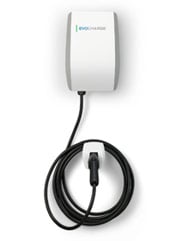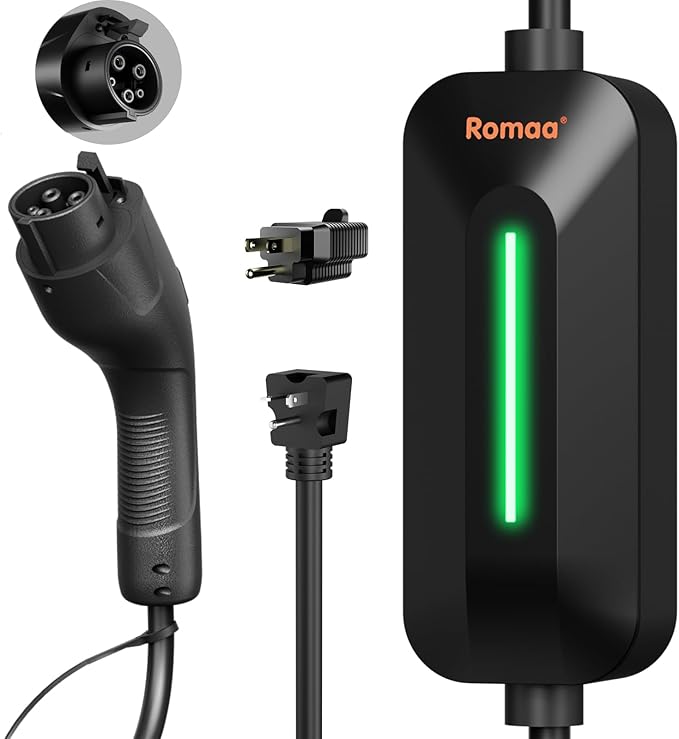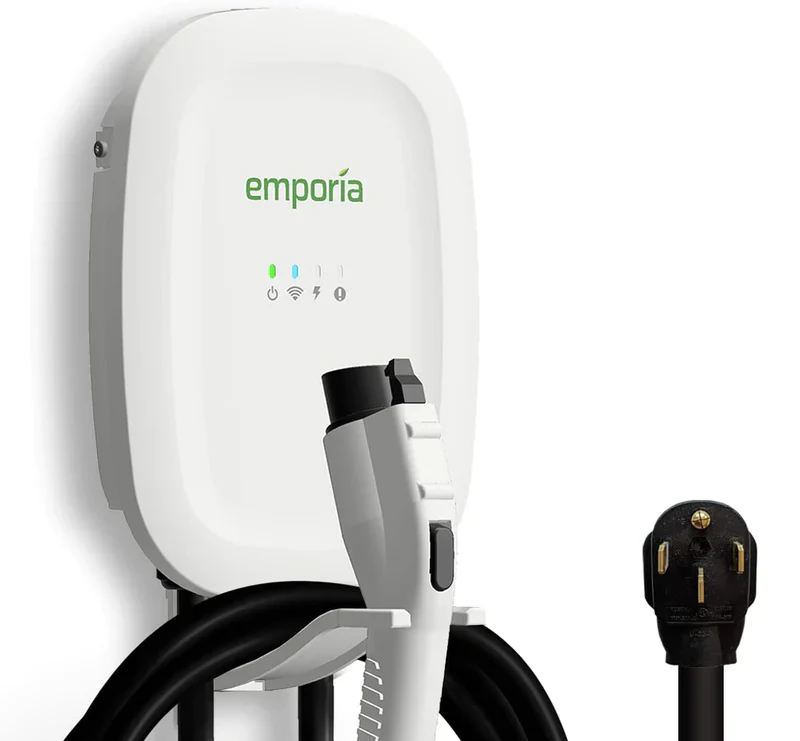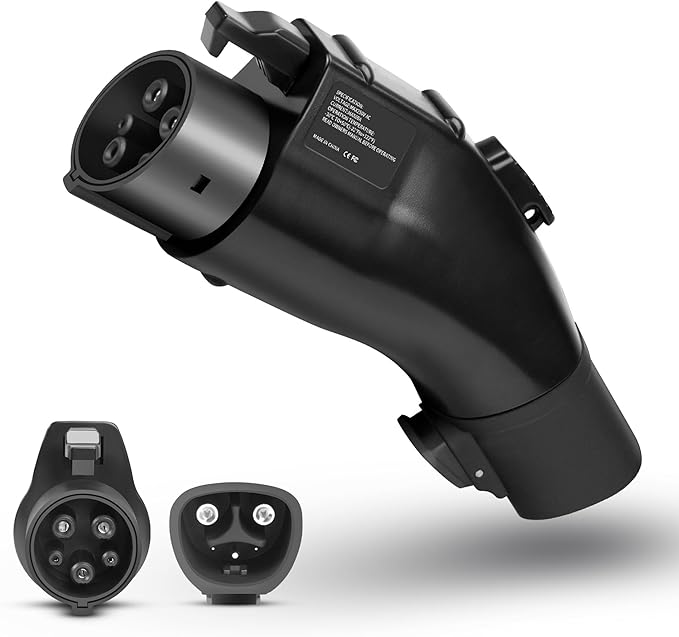If you’re driving—or planning to drive—an electric vehicle (EV), charging at home is likely your most convenient and cost-effective option. But not all home chargers are created equal. While most EVs come with a Level 1 charger that plugs into a standard wall outlet, many drivers quickly find that it doesn’t meet their everyday needs. That’s where Level 2 charging makes a real impact.
In this blog, we’ll break down the core differences between Level 1 and Level 2 EV chargers, what to expect in terms of cost and performance, and why upgrading to a Level 2 system is a smart investment for today’s EV owners.
What’s the Difference Between Level 1 and Level 2 Charging?
When it comes to charging an electric vehicle (EV) at home, understanding the distinction between Level 1 and Level 2 chargers is essential—especially if you’re looking for efficiency, convenience, and long-term savings.
Level 1 Charging: Basic but Slow
Level 1 chargers are the most basic entry point into EV charging and are usually included with your vehicle purchase. These chargers plug into a standard 120-volt household outlet, which makes them accessible for nearly any home or location with a basic electrical socket. While that convenience is appealing, the tradeoff is speed.
A Level 1 charger typically delivers around 1.2 kilowatts (kW) of power, translating to roughly 3 to 5 miles of driving range per hour of charge. If you only drive short distances each day or have a plug-in hybrid with a smaller battery, this might be enough to get by. However, for full battery EV owners or anyone with a longer daily commute, the pace can quickly become a bottleneck.
To put it in perspective, charging a vehicle with a 60 kWh battery using a Level 1 charger can take up to 50 hours—which is rarely feasible for consistent, everyday use.
That said, dual-function chargers like the Romaa Level 1 & Level 2 EV Charger (16 Amp) offer flexibility for EV owners who need an affordable backup solution. This kind of charger lets you start with Level 1 convenience and transition to faster Level 2 speeds when a 240V outlet is available, making it a smart option for those easing into home EV charging without committing to a full installation right away.
The Romma Portable Level 1 EV Charger
- 25FT Cable
- 16A 110V-240V with NEMA 6-20 and NEMA 5-15 Plug
- Compatible with J1772 EVs
- Multiple Protections, LED Indicators
Level 2 Charging: Faster, Smarter, and More Practical
Level 2 chargers are a significant step up. They use a 208- to 240-volt circuit—the same kind of power you’d use for large home appliances like dryers or ovens. These chargers can deliver between 6.2 and 19.2 kW, depending on the charger’s capacity and your home’s electrical infrastructure.
In practical terms, a Level 2 charger provides 25 to 40 miles of range per hour of charging. That means most EVs can go from nearly empty to fully charged in 3 to 8 hours, making overnight charging not only possible but convenient.
Many EV owners choose to install a Level 2 charger at home to eliminate the stress of slow charging and reduce reliance on public charging stations. It’s the difference between waiting more than a day for a full battery—or simply plugging in at night and waking up to a fully charged car.
For instance, the Emporia Level 2 EV Charger (48 amps) is a high-performing model that offers powerful 240V charging with smart features like energy tracking, scheduled charging, and load balancing. It’s designed to charge efficiently while saving on electricity costs during off-peak hours.
Emporia 48 Amp Smart Charger
- Great price for a 48 amp charger.
- Excellent smart features.
- Highly durable and resistant to extreme weather conditions.
- Easy installation.
More Than Just Speed: Smart Features and Efficiency
In addition to faster charging, many Level 2 chargers come with smart technology that gives you more control and insight into your energy use. Features such as app-based scheduling, real-time monitoring, and customizable charging levels allow you to optimize your charging habits, lower your electricity bill, and reduce your carbon footprint.
Want to learn more about how these features work and why smart chargers are becoming the new standard? Check out our guide: What is a Smart EV Charger and How Do They Work?
How a Level 2 EV Charger Works
A Level 2 EV charger significantly boosts the speed and convenience of charging by pulling more power from your home’s electrical system. Unlike the standard 120-volt outlet used for Level 1 charging, Level 2 chargers operate on a 208- to 240-volt circuit, typically requiring a dedicated 40- to 60-amp breaker. This allows them to deliver much more energy in a shorter time frame.
Most Level 2 chargers in North America use the J1772 connector, which is compatible with nearly all electric vehicles on the market today (with the exception of Tesla, which uses an adapter). Some units are plug-in models that connect to a NEMA 14-50 outlet, while others are hardwired directly into your electrical panel and must be professionally installed. The method you choose may depend on your home’s electrical setup and local building codes.
EV Adapter for Tesla to J1772
- Universal Compatibility
- Faster Charging
- Safe & Intelligent
- Compact & Portable
Smart, Efficient Charging with Emporia
One standout option in this space is the Emporia Level 2 EV Charger (48 amps). It offers powerful, high-speed charging at up to 11.5 kW, which translates to up to 40 miles of range per hour. But what makes Emporia especially attractive is its smart connectivity.
This Wi-Fi-enabled charger gives you access to scheduling features through the Emporia app, letting you time your charging for off-peak hours—when electricity rates are typically lower. You can also monitor your energy usage in real-time, track past charging sessions, and adjust amperage based on your circuit's capacity. These features help maximize cost savings, reduce grid strain, and enhance overall energy efficiency.
For more technical details on charging hardware, safety requirements, and best practices for installation, the U.S. Department of Energy’s EV charging guide is a valuable resource.
Comparison: Level 1 vs Level 2 vs level 3 Charging
| Level 1 | Level 2 | |
|---|---|---|
| Type of Current | AC | AC |
| Voltage | 120V | 240V |
| Connector Type | J1772 | J1772 |
| Average Charge Time (From Empty) * |
11-20 hours | 3-8 hours |
| Average Miles Per Hour Charged * | 5 | 12-80 |
| Speed | Slow | Fast |
| Use | Home | Home |
| Shop |
* Average charge time and mile per hour charged is dependent on the individual car’s acceptance rate and the power output of the charging station.
Even if your daily driving averages just 40 to 60 miles, a Level 2 charger makes it far easier to keep your vehicle fully charged—on your schedule, not the grid’s. Whether you’re looking for speed, control, or long-term savings, Level 2 charging is a smart upgrade for nearly every EV owner.
To learn more about smart charging technology and how it can benefit your home setup, visit our in-depth guide: What is a Smart EV Charger and How Do They Work?
What If You Don’t Have a 240V Outlet?
Level 2 EV chargers require a 240-volt outlet—similar to what many homes already use for appliances like dryers or electric ranges. If your garage or driveway setup doesn’t include one, don’t worry—it’s a common upgrade and one that a licensed electrician can typically install with minimal disruption.
Depending on your electrical panel and distance to the installation site, costs will vary. However, many homeowners qualify for rebates and incentives that significantly offset these expenses. Federal programs like the EV Charger Tax Credit (formally known as the Alternative Fuel Infrastructure Tax Credit) offer up to 30% back on installation costs, up to $1,000 for residential installations. Additional rebates may also be available from state governments or local utility companies.
To find current incentives available in your area, check the U.S. Department of Energy’s Incentive Database. Just enter your zip code or state to browse a list of active programs for residential EV charging.
Upgrading to a 240V outlet may feel like a big step, but it’s one that quickly pays off in convenience, cost savings, and charging speed—especially when paired with a high-performing, smart-enabled unit like the Emporia Level 2 EV Charger (48 amps).
Why Level 2 Charging Offers Better Long-Term Value
Level 2 charging isn’t just faster—it’s smarter, more efficient, and ultimately more cost-effective. While the upfront cost of purchasing and installing a Level 2 charger is higher than using a standard Level 1 plug, the long-term return is significantly greater in both financial and practical terms.
According to the U.S. Department of Energy (DOE), electric vehicle drivers can save up to $14,500 in fuel costs over a 15-year period when compared to driving a gas-powered car. A Level 2 charger helps maximize these savings by minimizing charging time, reducing reliance on public stations, and enabling drivers to charge at home during off-peak electricity hours—when rates are lower.
Efficiency, lower energy costs, and less vehicle downtime mean that a Level 2 charger pays for itself over time, especially for those who commute regularly or own multiple EVs.
Smart-enabled Level 2 chargers, like the Emporia Level 2 EV Charger (48 amps), take that value even further. These devices allow you to:
- Track detailed energy usage
- Schedule charging based on utility rate plans
- Optimize your home’s electrical load through load balancing
- Receive updates and insights via mobile app
By giving you more control over how and when you charge, smart Level 2 chargers support a more sustainable and budget-conscious approach to EV ownership.
Emporia 48 Amp Smart Charger
- Great price for a 48 amp charger.
- Excellent smart features.
- Highly durable and resistant to extreme weather conditions.
- Easy installation.
For more on the advantages of smart EV charging, check out our full breakdown here: What is a Smart EV Charger and How Do They Work?.
Bottom Line: Is a Level 2 Charger Worth It?
If you’re driving a full-time EV and want to eliminate range anxiety while boosting your convenience and cost savings, a Level 2 charger is well worth the investment. The difference in charging speed alone is enough to justify the upgrade—and when you factor in available incentives, long-term fuel savings, and smart charging features, the value becomes even clearer.
Choosing a trusted and feature-rich model like the Emporia Level 2 EV Charger (48 amps) ensures you’re getting not just faster charging, but smarter, more efficient charging for years to come.






